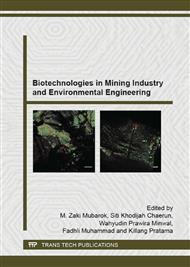p.3
p.7
p.11
p.15
p.19
p.23
p.28
p.32
Influence of Different Growth Conditions on the Composition of Extracellular Polymeric Substances of Acidithiobacillus ferrooxidans and Acidithiobacillus ferrivorans Species
Abstract:
Acidithiobacillus ferrooxidans and Acidithiobacillus ferrivorans are used in bioleaching to recover metals such as copper or gold from low-grade ores. At. ferrooxidans is one of the best studied bioleaching microorganisms. At. ferrivorans is known for its ability to leach ores at low temperature. Both microorganisms are involved in acid mine drainage (AMD) formation. The cells are embedded in extracellular polymeric substances (EPS), which play an important role in the attachment to metal-sulfide-surfaces and in catalysis of their dissolution. EPS amounts and compositions differ, depending on the energy source, as it was shown for At. ferrooxidans R1. Recently, At. ferrooxidans strains were reclassified into four different subgroups, which are considered to correspond to four different species. As well, a biofilm study, using three of these closely related iron-oxidizing Acidithiobacillus species, demonstrated differences regarding attachment to pyrite among them. Consequently, this study focuses on the investigation of At. ferrooxidans and At. ferrivorans species and their EPS composition with regard to varying cultivation conditions. Also different energy sources like, elemental sulfur or pyrite were tested. EPS were extracted by the use of a cation exchange resin (DOWEX). Obtained EPS were analyzed for their total amount of proteins, extracellular DNA (eDNA) and carbohydrates.
Info:
Periodical:
Pages:
11-14
DOI:
Citation:
Online since:
November 2015
Authors:
Keywords:
Price:
Сopyright:
© 2015 Trans Tech Publications Ltd. All Rights Reserved
Share:
Citation:


